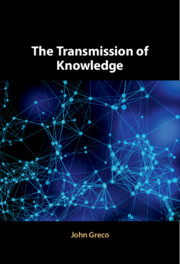Book contents
- The Transmission of Knowledge
- The Transmission of Knowledge
- Copyright page
- Contents
- Preface
- Acknowledgments
- 1 Introduction
- 2 The Framework Presented
- 3 Joint Agency and the Role of Trust in Testimonial Knowledge
- 4 Social Norms and Social Sensibilities
- 5 A Unified Account of Generation and Transmission
- 6 The Framework Extended
- 7 Education and the Transmission of Understanding
- 8 Reductionism and Big Science
- 9 Social Religious Epistemology
- Appendix: The Garbage Problem
- Bibliography
- Index
8 - Reductionism and Big Science
Published online by Cambridge University Press: 21 August 2020
- The Transmission of Knowledge
- The Transmission of Knowledge
- Copyright page
- Contents
- Preface
- Acknowledgments
- 1 Introduction
- 2 The Framework Presented
- 3 Joint Agency and the Role of Trust in Testimonial Knowledge
- 4 Social Norms and Social Sensibilities
- 5 A Unified Account of Generation and Transmission
- 6 The Framework Extended
- 7 Education and the Transmission of Understanding
- 8 Reductionism and Big Science
- 9 Social Religious Epistemology
- Appendix: The Garbage Problem
- Bibliography
- Index
Summary
Chapter 8 considers the widespread epistemic dependence that characterizes “big science,” and uses the information economy framework to dispel the worry that such dependence is inconsistent with the standards for scientific knowledge. This leads to a new argument against reductionism in the epistemology of testimony. First, reductionism is shown to be untenable for scientific knowledge.Second, if reductionism must be rejected for scientific knowledge, then it should be rejected more generally. This second idea can be vindicated in two ways. First, anti-reductionism about scientific knowledge entails anti-reductionism about knowledge in general, since anti-reductionism is best understood as the thesis that some transmitted knowledge cannot be reduced to generated knowledge. Second, if anti-reductionism is required for scientific knowledge, then reductionism for non-scientific knowledge is unmotivated. The most elegant position is anti-reductionism about knowledge transmission in general.
Keywords
- Type
- Chapter
- Information
- The Transmission of Knowledge , pp. 145 - 160Publisher: Cambridge University PressPrint publication year: 2020

